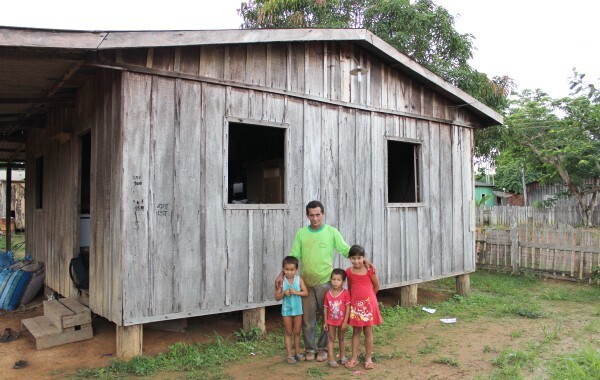Sebastião de Oliveira Pereira, a small trader from the town of Lábrea in the south-east of the state of Amazonas, reported to the police that loggers were blockading roads in the region as part of a campaign to expel communities of rubber-tappers from the forest. Instead of Sebastião in front of his home following up his complaint, the police arrested him, apparently because loggers had counter-attacked, claiming that a woman rubber-tapper, Nilcilene Miguel de Lima, known as Nilce, had accused Sebastião of illegal logging.
Sebastião in front of his home following up his complaint, the police arrested him, apparently because loggers had counter-attacked, claiming that a woman rubber-tapper, Nilcilene Miguel de Lima, known as Nilce, had accused Sebastião of illegal logging.
Sebastião was finally released after 70 days, after his community had organised a petition with 370 signatures and had raised R$25,000 (£10,000) to pay for a lawyer to appeal against his arrest. Nicilene, a respected leader in the community, has strongly denied that she made the allegations against Sebastião. She is receiving police protection, as she herself is now the target of intimidation.
Ana Aranha, a journalist with LAB’s partner in Brazil, Pública, has published a series of reports on the case.
It is a fast-movng story. While on Thursday 1 March LAB was preparing with Ana a summary in English of one of her reports, news came that,  Nilcewhen Nilce had reached home that day with her police bodyguard, she had found her dog lying dead in front of her house, shot through the ear. It was clear case of intimidation.
Nilcewhen Nilce had reached home that day with her police bodyguard, she had found her dog lying dead in front of her house, shot through the ear. It was clear case of intimidation.
We publish first some extracts in English of Ana’s reports and then the full text in Portuguese of one of Ana’s reports. The article contains links to other of Ana’s reports.
Extracts
‘A body turned up here in this river’, says Nicilene Miguel de Lima, farmer and rural leader. ‘It took two weeks for them to come and remove it. We had to use branches to keep the vultures off.’
Wearing a bullet-proof jacket and bumping around in the back of a National Security Force vehicle, Nicilene has now pointed out four places where bodies riddled with gunshot wounds were found on the roads of southern Lábrea, a district in the Brazilian state of Amazonas. ‘There have been times when no-one turned up to collect the body, so the people just buried it where it was.’
It is late afternoon. The vehicle has to reach Nilcilene’s house before nightfall, and the two police officers will keep guard there through the night. A few kilometres before the house, Nicilene gets a shock when she sees a blue truck on the opposite side of the road.
‘It’s him! It’s Pitbull’s truck.’
‘Pitbull’ is the nickname of Vicente Horn, one of the reasons why Nilcilene has a nine-strong team of bodyguards from the National Security Force protecting her. He is one of the people behind the long list of death-threats against Nilcilene, who by now has lost count of the number of times she has been put on a death-list by the killers in the service of the land-grabbers and loggers.
The threats started in 2009, when she became president of the association Deus Proverá (‘God will provide’) , formed by small producers to defend the community against invasions into their territory and the theft of trees. The following year, after organising complaints and petitions against the criminals, Nilcilene was beaten and her house was set on fire in a well-advertised arson attack. In May 2011 she was forced to flee wrapped in a sheet so as not to be spotted by the gunman stationed at her front door. The National Security Force team was despatched in October to ensure that Nicilene could return home and continue to report the problems in the region.
Even with an armed guard at her front door, Nilcilene can’t sleep without sleeping pills. She knows that she is protected for the time being, though the surrounding situation hasn’t changed. Adding her name to the list of the Human Rights Defenders Protection Programme (a joint programme of the National Human Rights Secretariat and the Ministry of Justice) has, so far, been the only action the federal government has taken to counter the organised crime that is growing in the region.
Lábrea is in the south-east of the state of Amazonas, at the end of the Trans-Amazonia highway, where the virgin forest starts. To reach the Nilce’s house was set on fire south of the district, where Nilcilene’s community lives, you have to go through the neighbouring state of Rondônia. It is one of those places the Brazilian state hasn’t reached, with rich picking for people who flout the law.
Nilce’s house was set on fire south of the district, where Nilcilene’s community lives, you have to go through the neighbouring state of Rondônia. It is one of those places the Brazilian state hasn’t reached, with rich picking for people who flout the law.
As well as not having electricity, telephones, a health centre or a police station, the 800 or so families in Lábrea live under the control of a gang of gunmen. The gang consists of 15 ‘professionals’ from Rondônia, Mato Grosso and Bolivia. They sell their services to land-grabbers and loggers, who ignore anything (and anyone) in their path to reach the ‘green gold’: the forests full of valuable hardwoods such as ipês, cedars and angelim.
Pública has collected more than 30 accounts from local families of the gang’s methods. They tell of physical attacks on adults and young people, death threats, houses being burnt and robberies and searches followed by the ransacking of houses.
TEM MUITA GENTE SUMIDA, ENTERRADA LÁ PARA DENTRO”
Depois de anunciar que seria testemunha a favor de produtores em disputa por terra, produtor diz que foi preso injustamente
Por Ana Aranha, 29.02.12
Sebastião de Oliveira Pereira trabalha com frete para comprar e revender os produtos colhidos por castanheiros e seringueiros do sul de Lábrea. Como há grileiros querendo expulsar esses seringueiros de sua terra, ele avisou que iria depor a favor dos seringueiros. Meses depois, foi preso. Acusado de cometer os crimes que queria denunciar: pistolagem e dano ambiental, entre outros.
Segundo o mandado de prisão, ele foi denunciado pela líder Nilcilene Miguel de Lima. Ela nega ter feito qualquer denúncia contra ele e ajudou a levantar um abaixo assinado para tirá-lo da cadeia.
“Nasci no mato aqui do sul de Lábrea, minha família mexia com seringa e açaí. Com 13 anos tiraram a gente a bala e perdemos tudo, passamos oito anos na Bolívia. Quando voltei, em 2010, vim morar de aluguel aqui na vila [Nova Califórnia, vila mais próxima] e comecei a fazer frete para vender o açaí, cupuaçu e castanha que o pessoal pega lá dentro. Nessa época, os grileiros já tinham colocado dois homens na porteira para impedir os seringueiros de entrar.
Um dia de 2010, topei com esse grileiro e mais cinco peões armados no caminho. Ele disse: ‘se você entrar, eles vão te linchar’. Eu disse que estava só fazendo meu serviço, o frete. Mas fiquei atento porque eles são perigosos, matam mesmo. Tem muita gente sumida aí, queimado, enterrado lá para dentro.
Depois eles ameaçaram botar fogo no meu carro porque eu não parei de levar as coisas para o povo. Eles querem tirar todo mundo lá de dentro, mas não pode fazer uma coisa dessas, já tem muito seringueiro passando fome aqui na vila. No tempo que fomos criados na mata, não tinha onde estudar. Eles não tem um saber para trabalhar na cidade.
Como eu não posso entrar mais com a caminhonete, vou até onde dá e depois levo as coisas nas costas. Levo tábua, arroz, feijão, o que for preciso. Conheço essa gente aí desde que sou menino, não vou ajudar?
O problema mesmo foi quando comecei a falar que ía depor a favor dos seringueiros na disputa pela terra. Aí esse grileiro não gostou, começou a espalhar que sou eu que trabalho na porteira dele. Que eu é que bato nos outros, derrubo árvore. Um dia eu estava na associação vendendo cupuaçu e ele passou de caminhonete com a polícia, apontando para mim. E não é que a polícia me prendeu? Me levaram para Extrema e Porto Velho. Fiquei 70 dias preso por cinco castigos: dano ambiental, tentativa de homicídio, pistolagem, porte de arma e massacre –que é dar peia, bater nos outros.
 O delegado disse que foi a Nilcilene e outras castanheiras que tinham registrado queixa contra mim, mas eu não acreditei. Eu conheço esse povo há muito tempo, eles não íam fazer isso. Esse povo se reuniu foi para fazer um abaixo assinado, 370 assinaturas dizendo que eu não fazia essas coisas. Minha família e os amigos juntaram 25 mil reais para pagar o advogado e me libertar.
O delegado disse que foi a Nilcilene e outras castanheiras que tinham registrado queixa contra mim, mas eu não acreditei. Eu conheço esse povo há muito tempo, eles não íam fazer isso. Esse povo se reuniu foi para fazer um abaixo assinado, 370 assinaturas dizendo que eu não fazia essas coisas. Minha família e os amigos juntaram 25 mil reais para pagar o advogado e me libertar.
Agora que sai, vou entrar com advogado porque fui preso inocente. E o povo dizendo pros meus filhos que eu bati nos seringueiros? Como que pode uma coisa dessas?
O mandado de prisão diz que foi a Nilce que me denunciou, que o depoimento está em anexo. Mas não tem anexo nenhum. Não entendo como pode acontecer uma coisa dessas.”
Leia mais: Nilcilene, com escolta e colete à prova de balas: “eles vão me matar”
ÚLTIMAS REPORTAGENS
-
Nilcilene, com escolta e colete à prova de balas: “eles vão me matar”
Liderança na Amazônia ganha proteção da Força Nacional, mas vive acuada por ameaças. À sua volta, madeireiros e grileiros seguem livres.
-
Vídeo: pistoleiros perseguem famílias ligadas à líder
Depois que Nilcilene ganhou escolta, criminosos passaram a ameaçar as pessoas próximas a ela. Duas famílias já tiveram que fugir. Assista ao depoimento
-
“A ordem era tocar fogo com a gente dentro”
Assentada foi expulsa da terra depois de sofrer ameaças e ver seu barraco ser queimado em um incêndio criminos



